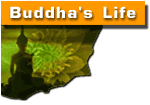Those who have
never undergone mental training, generally rely on rationalization.
Thus, to them the Way, the Goal, and Enlightenment are like
fruits out of season. They understand that after such and
such seasons, there will be no more mangoes and lamyai, However,
as a matter of fact the Truth in the Buddha's Teachings exists
in conjunction with the world. Those who see no Dhamma, such
as those who make the above statement, actually have Dhamma
in themselves, but they see it not.
The Buddha was
enlightened, not by perceiving the truth of anything Dhamma
exists, cut people do not see it. This means, Dhamma is the
Four Noble Truths. The Buddha points at the suffering which
includes, for example, suffering of birth. He points at the
causes, which include the three types of craving, namely,
for example,
sensual craving. These are genuine Dhamma. They are real and
exist in each and everyone of us. But people do not see them.
They do not understand them. In other words, they have not
undergone sufficient mental training; they have not cleaned
the heart enough so that they are able to reach the state
of purity. That is why they cannot perceive those Noble Truths.
Another point
is that there is no absolute Dhamma. It is there only in relation
to the world. This is the usual expression, meaning that everything
exists in the world, belongs to the world: birth belongs to
the world, so do aging, sickness, and death. Cravings, both
the sensual craving and the craving to become, belong to the
world. There is no absolute Dhamma existing by itself. Those
who train themselves so that they perceive it means that their
heart is Dhamma itself.
The heart has
become relieved of attachments. The heart reaches the state
of calm and cool. Relieving itself from the entire world.
So they begin to perceive the world as Dhamma. That is, they
begin to see that everything is nature, natural as it is.
So, they do not take hold of anything. This is why I say there
is no absolute Dhamma; there is only the world. Whoever perceives
the world as it is and refrains himself from getting attached,
both he himself and the object from which he is detached become
Dhamma. This is a reverse. It is an idiomatic expression.
Both are right. At first you said absolute Dhamma exists.
Actually the
Way, the Goal, and Enlightenment are nothing but the one who
has purified oneself with wisdom, who percieves the world
as it is with wisdom without getting attached to the world.
One may call this the Way, the Goal, and Enlightenment or
whatever. The problem is only that one has degraded oneself
from the Way, the Goal, and Enlightenment. That's all. And
this is because one does not train oneself in that direction.
The Buddha himself
was enlightened of the Way, the Goal and Enlightenment, not
from elsewhere. He die not bring them from any other sphere.
Infinite knowledge is the true acquires this knowledge by
himself, so his knowledge is called Sabbannuta nana. The later
generation of disciples learn this from the Buddha's earlier
disciples. How can one say that the Way and the Goal have
degenerated? They are not degenerated.
Many people
today are afraid of that. They are afraid that the Teachings
will decline from Thailand, being afraid that some political
ideologies will tamper with them and destroy them. But truly
the one who is so afraid does not realize that he himself
is not able to live up even to the five precepts. There, the
Buddha's Teachings in himself have deteriorated, isn't that
right?. |

